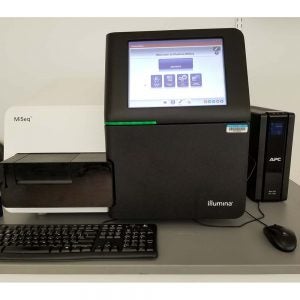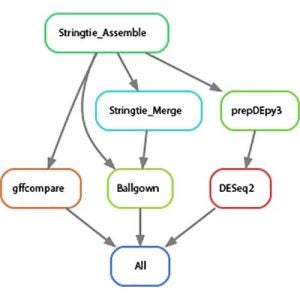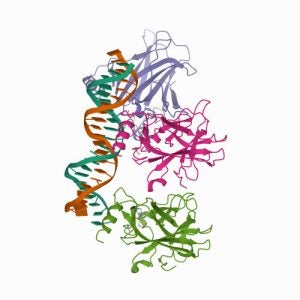
Molecular Informatics Core (MIC)
On July 1, 2021, the RI-INBRE Bioinformatics Core joined resources with the URI Genomics and Sequencing Center (GSC) to form the new RI-INBRE Molecular Informatics Core (MIC). The MIC is structured according to the new National Institutes of Health INBRE directive to maintain a Data Sciences Core for Biomedical Research.
The MIC is open to all users and serves researchers in both biomedical and environmental topic areas and serves four primary purposes:
- Nucleotide sequencing
- Bioinformatics and data science services
- Access to molecular modeling software
- 3D visualization including virtual reality and 3D printing

The sequencing component is maintained by sequencing manager Janet Atoyan who served the same role in the GSC.
Services include sample library prep, Sanger sequencing, and next-gen sequencing (NGS) with Illumina MiSeq.

The bioinformatics and data science component is maintained by Core Director Chris Hemme and provides data science services to our users. While bioinformatics and omics data analysis anchors this component, we provide additional data science services following NIH’s data science mandates. We also participate in the NIH STRIDES initiative to promote cloud computing by biomedical researchers. We are currently working to integrate the sequencing and analysis components to provide more streamlined bench-to-manuscript sequencing and analysis pipelines.

The molecular modeling component serves as a resource for users interested in small or large molecule analysis, docking simulations, etc. We maintain licenses for Spartan and Molecular Operating Environment for on-site users.
The 3D visualization component provides services using virtual or augmented reality (VR/AR) and 3D printing. We maintain a 3D printer that is used to print proteins and other molecules. We also maintain four virtual reality headsets for the URI College of Pharmacy that are used in teaching and app development. For the past three years, the MIC has collaborated with the Innovative Technology Services Student Technology Assistant program of URI Information Technology Services to develop VR/AR apps for integration into the curriculum. Led by Roy Bergstrom, the ITS-STA program employs computer science students at URI to develop apps and animations for use in curriculum development. Together with URI faculty we have developed multiple VR/AR applications including cell culture and nanoparticle synthesis VR training apps, pharmacology and medicinal chemistry VR apps, and an AR app for exploring the Heber W. Youngken Jr Medicinal Garden at the URI College of Pharmacy.
molecules. We also maintain four virtual reality headsets for the URI College of Pharmacy that are used in teaching and app development. For the past three years, the MIC has collaborated with the Innovative Technology Services Student Technology Assistant program of URI Information Technology Services to develop VR/AR apps for integration into the curriculum. Led by Roy Bergstrom, the ITS-STA program employs computer science students at URI to develop apps and animations for use in curriculum development. Together with URI faculty we have developed multiple VR/AR applications including cell culture and nanoparticle synthesis VR training apps, pharmacology and medicinal chemistry VR apps, and an AR app for exploring the Heber W. Youngken Jr Medicinal Garden at the URI College of Pharmacy.
For more information about our services, please contact MIC Director Chris Hemme (hemmecl@uri.edu) or Sequencing Manager Janet Atoyan (jatoyan@uri.edu).
